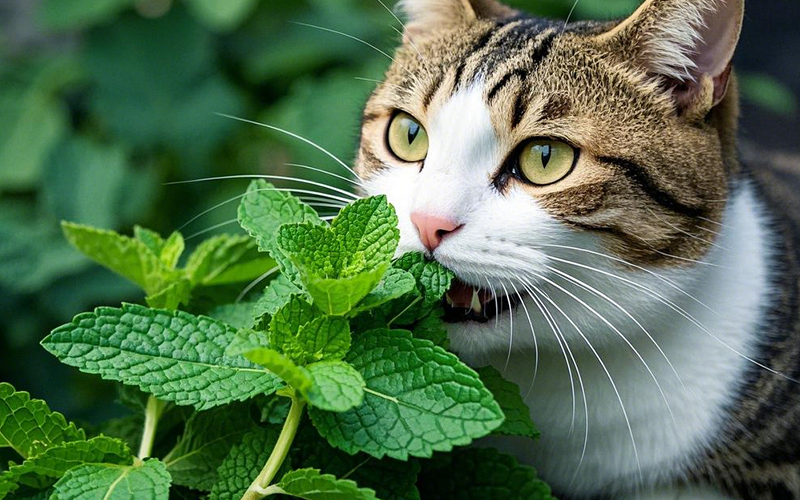Can Cats Eat Mint Leaves? Let’s Discover the Facts!
- 18 Mar 2025 10:33
Mint is a refreshing herb that many humans enjoy, but can cats eat mint leaves? The short answer is: it’s not safe to feed mint leaves to cats. While mint is not necessarily toxic in small amounts, there are some important risks and considerations you should be aware of. Let’s dive into the details!

🍃 Why Cats Should Avoid Mint Leaves
Mint Can Cause Digestive Issues: Mint leaves contain compounds like menthol, which can be irritating to a cat’s digestive system. If your cat consumes too much mint, it can lead to vomiting, diarrhea, or an upset stomach. These digestive disturbances can be uncomfortable for your feline friend and may require medical attention if severe.
Potential Toxicity: While mint itself is not considered highly toxic, some types of mint, like peppermint, can cause more serious problems if consumed in large quantities. The oils in mint leaves can have a strong effect on cats, causing symptoms like lethargy, drooling, or even muscle tremors.
Choking Hazard: If your cat chews on fresh mint leaves, they could potentially cause a choking hazard, especially if they swallow large pieces that are difficult to digest.
🚫 Risks of Mint in Your Cat's Diet
Feeding your cat mint leaves can lead to a variety of negative health effects:
Upset Stomach: The strong menthol content in mint can cause gastritis or irritation in your cat’s stomach lining, leading to discomfort, nausea, or diarrhea.
Respiratory Issues: The strong scent of mint can also irritate a cat's respiratory system, causing sneezing or breathing difficulties, especially for cats with pre-existing respiratory conditions.
Toxicity in Large Amounts: Although small amounts of mint are not generally harmful, eating large quantities can lead to toxicity. Symptoms may include vomiting, weakness, and loss of appetite.
🐱 Safer Alternatives to Mint for Cats
Instead of mint, here are some safe and healthy alternatives to give your cat:
Catnip: Cats are usually drawn to catnip, a herb in the mint family, but it’s completely safe for them. It provides a fun, playful experience for your cat and can help relieve stress. 🌿
Cat Grass: Some cats enjoy chewing on cat grass, which is a safe option that can aid digestion and provide some fiber to their diet. It’s a great alternative for cats who like to nibble on plants. 🌱
Valerian Root: Another herb that many cats enjoy is valerian root, which can have a similar effect to catnip and help stimulate playfulness and relaxation in your feline.
🤖 PettureX: Your Pet Health Assistant
If you ever find yourself unsure about whether a particular plant or food is safe for your cat, PettureX is here to help! PettureX is an AI-powered pet health assistant that provides 24/7 guidance on all aspects of pet care, including food and plant safety. With PettureX, you can get real-time answers to ensure your cat’s health and safety. 🐾💡
🏁 Conclusion: Can Cats Eat Mint Leaves?
In conclusion, it’s best to avoid giving your cat mint leaves. While mint is not highly toxic, it can cause digestive upset and other health problems, especially in larger amounts. Stick to safe alternatives like catnip or cat grass to keep your feline happy and healthy.
For any questions or concerns about your cat’s diet or safety, PettureX is always available to offer expert advice and assistance! 🐱💚
Related

The Burning Question: Can Cats Eat Jalapenos? A Comprehensive Safety Guide
- 21 Apr 2025
Cool Temptation: Can Cats Eat Ice Cream Safely? The Vet-Backed Truth
- 21 Apr 2025
Frankly Dangerous: Can Cats Eat Hot Dogs? Vet Explains the Serious Risks
- 16 Apr 2025
A Purrfect Protein? Can Cats Eat Ground Turkey Safely? (Vet-Reviewed Guide)
- 16 Apr 2025
Gritty Situation: Can Cats Eat Grits Safely? Vet Explains the Risks
- 16 Apr 2025
Crunchy Query: Can Cats Eat Green Peppers? A Vet-Reviewed Safety Analysis
- 16 Apr 2025
Gravy Danger Zone: Can Cats Eat Gravy Safely? (Vet-Reviewed Warning)
- 16 Apr 2025
Toxic Temptation: Can Cats Eat Grapefruit? Vet Explains the Dangers
- 16 Apr 2025
Emergency Meal or Major Mistake? Can Cats Eat Dog Food For A Couple Days? (Vet Guide)
- 16 Apr 2025
Dandelions & Felines: Can Cats Eat These Common Weeds Safely? Vet Explains
- 16 Apr 2025
